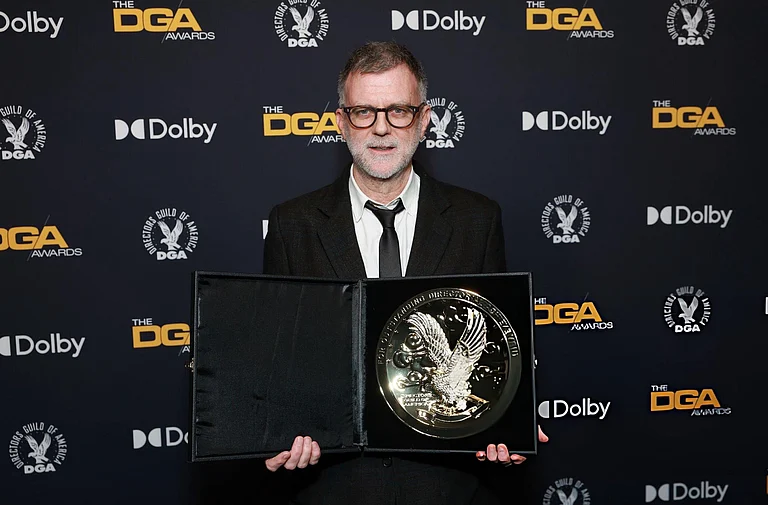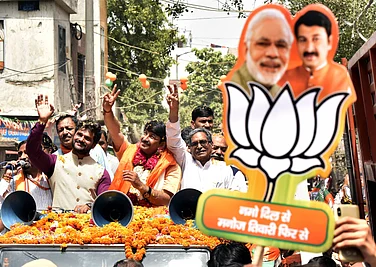Bal Thackeray, who has always criticized the dynastic politics of the Congress family, introduced his grandson, Aditya Thackeray (Udhav Thackeray's son] to active politics on October 17, saying: “I don't believe in dynastic rule. Uddhav was elected by Shiv Sainiks not me. I will never force my family members to join Sena”.
Aditya Thakeray will now be heading the Yuva Sena, the youth wing of the Shiv Sena. Shiv Sena is said to have decided to launch a youth wing under Aditya mainly to counter the growing influence of Raj Thackeray's Maharashtra Navnirman Sena among the Maharashrian youth. Sena feels it has too many leaders over the age of 50 and they hold no appeal among youngsters.
Aditya Thackeray hit the headlines recently when he and members of the Bharatiya Vidyarthi Sena (BVS) "took objection" to certain anti-Shiv Sena passages in Rohinston Mistry's Such A Long Journey. There had been some speculation why a book published in 1991 that was introduced in Mumbai University's second year BA syllabus in 2007 was being targeted now. The BVS complained to Rajan Welukar, the university’s vice chancellor, whose appointment in July this earlier had raised many eyebrows. The V-C used the emergency powers under Section 14 (7) of the Maharashtra Universities Act, 1994, to withdraw the book from the syllabus just before the first-term examinations.
Civil society and academicians met in Mumbai last evening, about 125 in all, to send out a strong signal that such tactics are nothing but censorship, and have no place in an academic institution. There was a book reading session, in which noted personalities such as Dolly Thakore and Mehere Pestonjee, read out from the four pages that ostensibly offended the young Aditya Thackeray and led to the book's withdrawal. The reading was followed by a panel discussion on Censorship and Politics.
Our correspondent Snigdha Hasan was covering the event. She picked up a copy of Mistry's statement, that was read out by documentary filmmaker Anand Patwardhan, and typed it out for us.
***
The Shiv Sena’s student wing complains to the Vice-Chancellor of Mumbai University that it is offended by the novel Such a Long Journey. Copies are burnt at the University’s gates. Needless to say, no one has actually read the book. The mob leader, speaking in Hindi to a television camera says: The author is lucky he lives in Canada -- if he were here, we would burn him as well. The mob demands the book’s removal, within 24 hours, from the syllabus. The good Vice-Chancellor obliges the mob.
All this happened in September. Subsequently, the Shiv Sena sent fulsome congratulations to the Vice-Chancellor on his prompt and wise decision. Students and faculty protested the abomination, unwilling to accept his abuse of power, his invoking of emergency measures unused in the University’s 153-year old history, circumventing the process for syllabus change, damaging the University’s reputation, succumbing to political pressure.
For days, the Vice-Chancellor said nothing, offered no explanations. He is, we are told, a Ph.D. in statistics -- a useful subject for dealing with permutations, combinations, probabilities but silent on the matter of moral responsibility.
In this sorry spectacle of book-burning and book-banning, the Shiv Sena has followed its depressingly familiar, tediously predictable scripts of threat and intimidation that Mumbai has endured since the organization’s founding in 1966. But it is the expeditious decision by Mumbai University which causes profound dismay. After his long silence, the Vice-Chancellor has now stated that he, in fact, followed the correct procedures, and the decision was taken by the Board of Studies. The outgoing Board of Studies, to be precise.
More bobbing, weaving, and slippery behaviour is no doubt in the offing. But one thing remains: a political party demanded an immediate change in the syllabus, and Mumbai University provided deluxe service via express delivery, making the book disappear the very next day. The University, in the person of the Vice-Chancellor, occupies an exalted position in civilized society, the champion of academic independence and freedom of expression. Instead, Mumbai University has come perilously close to institutionalizing the ugly notion of self-censorship. The Vice-Chancellor knows what he must do to remove the stain.
This sordid story, however, does have a bright spot. Civil society has responded, in Mumbai and elsewhere, with outrage, questions, petitions; it is inspiring to see. The stand taken by teachers, citizens’ groups, bloggers, journalists is exemplary. Who knows, it may even educate the main actors about the working of a real democracy.
As for the grandson of the Shiv Sena leader, the young man who takes credit for the whole pathetic business, who admits to not having read the book, just the few lines that offend him and his bibliophobic brethren, he has now been inducted into the family enterprise of parochial politics, anointed leader of its newly minted “youth wing.” What can -- what should -- one feel about him? Pity, disappointment, compassion? Twenty years old, in the final year of a B.A. in history, at my own Alma Mater, the beneficiary of a good education, he is about to embark down the Sena’s well-trodden path, to appeal, like those before him, to all that is worst in human nature.
Does he have to? No. He is clearly equipped to choose for himself. He could lead, instead of following, the old regime. He could say something radical -- that burning and banning books will not feed one hungry soul, will not house one homeless person nor will it provide gainful employment to anyone (unless one counts those hired to light bonfires), not in Mumbai, not in Maharashtra, not anywhere, not ever.
He can think independently, and he can choose. And since he is drawn to books, he might want to read, carefully this time, from cover to cover, a couple that would help him make a choice. Come to think of it, the Vice-Chancellor, too, may find them beneficial. First, Conrad’s Heart of Darkness, in order to consider the options: step back from the abyss, or go over the edge. Next the Nobel laureate Rabindranath Tagore’s Gitanjali. And I would like to urge particular to attention to this verse:
Where the mind is without fear and the head is held high
Where knowledge is free
Where the world has not been broken up into fragments
By narrow domestic walls
...Into that heaven of freedom, my Father, let my country awake.






















